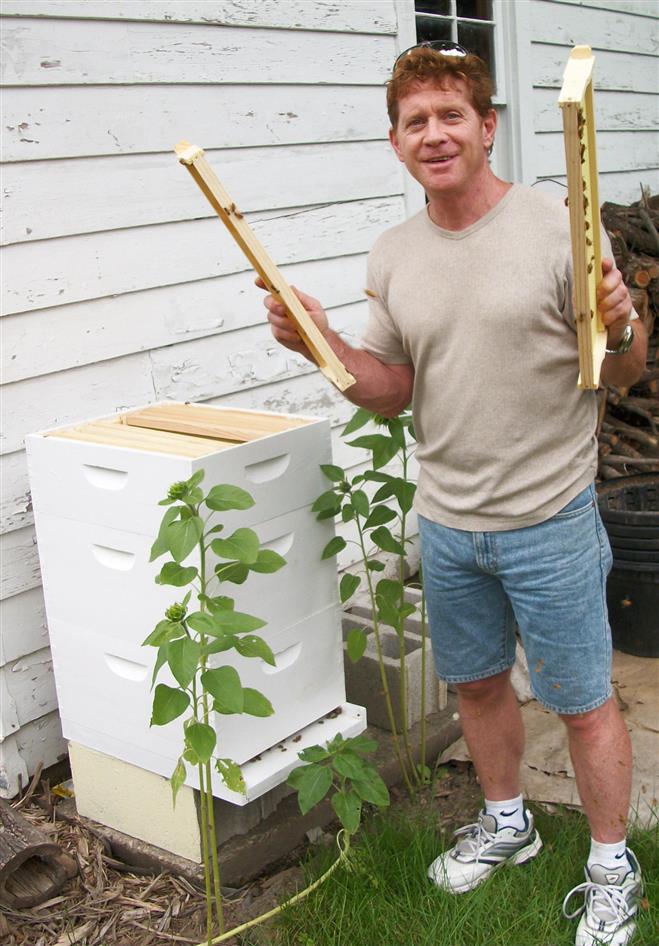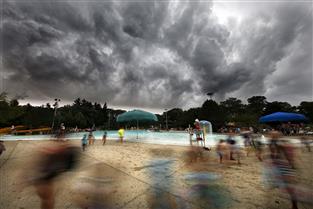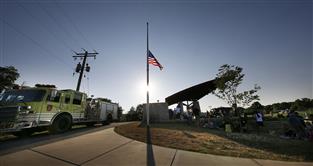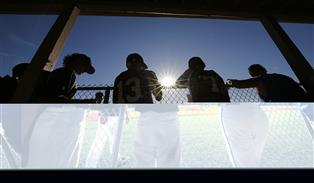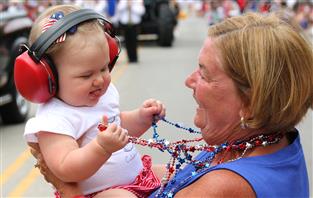Beekeeper urges Wauwatosa to allow hobby
Tosan Mykl Dettlaff is looking to generate a buzz about beekeeping to save his hive.
He has been raising bees in his Livingston Avenue backyard since March, but he has a problem: A 1980 ordinance makes it illegal to raise bees within city limits.
He didn't know about the ordinance until a neighbor pointed it out, and the Wauwatosa Health Department has given him until March to move the bees out.
He's not giving up without a fight.
Dettlaff's mission is to legally raise his hive, and he has asked his alderman, Bobby Pantuso, to help him pass an ordinance that would make his hive legal. He pointed out that the city of Milwaukee allows beekeeping, as long as the bees are made to fly six feet in the air and have a nearby water source. He also said Madison allows for up to six hives per property, with a license.
Pantuso said Dettlaff would need a groundswell of support from city residents in order for such an ordinance to pass.
James Beix, environmental health manager for Wauwatosa, said that if the Common Council directs his department to regulate beekeeping, the resolution could look much like Milwaukee's.
He added Dettlaff hasn't been the first person to attempt to raise bees in Wauwatosa. The city has already removed another person's hive.
Dettlaff was inspired, he said, by the October ordinance allowing Tosans to raise chickens inside city limits.
"If the chicken ordinance passed, the bee ordinance could be a shoe in," he noted.
Safety concerns
From Beix's standpoint, public safety is a foremost concern. The size of the swarm, location to busy roads and warning signs for those who are allergic would have to be considered.
"There are a lot of variables to consider," he added.
As far as safety goes, Dettlaff said, bees get a bad rap. He argues that wasps and hornets are the perpetrators of most stings and that bees will only sting people to protect their hive.
"Honeybees do not want to lose their life unless it's for the good of the colony," he added.
The bees are sensitive to a disturbance in their hive, such as shaking or a shock, he noted. Disturbing a hive will send the drones into defense mode, causing them to fly out and sting any animal nearby.
Some days he'll sit in front of the hive, his face mere inches from its opening. The bees, he said, will simply fly around him.
More than honey
To Dettlaff, beekeeping isn't solely about the 15 gallons of honey a healthy hive can produce annually. To him, the bees are pets. To him, the bees need his help due to declining national bee populations. The U.S. Department of Agriculture published that in the 2012-13 winter, bee losses were at 31.1 percent.
When his hive is active in the summer, Dettlaff likes to look out his window and see the workers leave the hive in search of nectar.
"I'm amazed by them," he added.
They also help pollinate his garden. When he moved to Wauwatosa he converted his backyard into a huge garden and made sure his hive was close to his plants.
For more information:
Contact: Janemort1980@yahoo.com
More from News and Features
- Anodyne Coffee plans to open location in Wauwatosa Village
- Wauwatosa Meetings: Aug. 4
- Video: Wauwatosa girl's curbside ice cream stand raises money for the hungry
- Wauwatosa News and Notes: Hands-only CPR training offered; Firefly Art Fair is Aug. 6-7
- Wauwatosa Ask Now: Why are there barriers and fencing along the North Avenue bridges over the Menomonee River?
- Mystery Photo Contest: July 28
- Wauwatosa gears up for National Night Out event, this year at the zoo
- Election 2016: Wisconsin's 4th District candidates weigh in
- Wauwatosa's Luther Manor residents share smiles through flower delivery
- Wauwatosa Police Report: July 17-23





